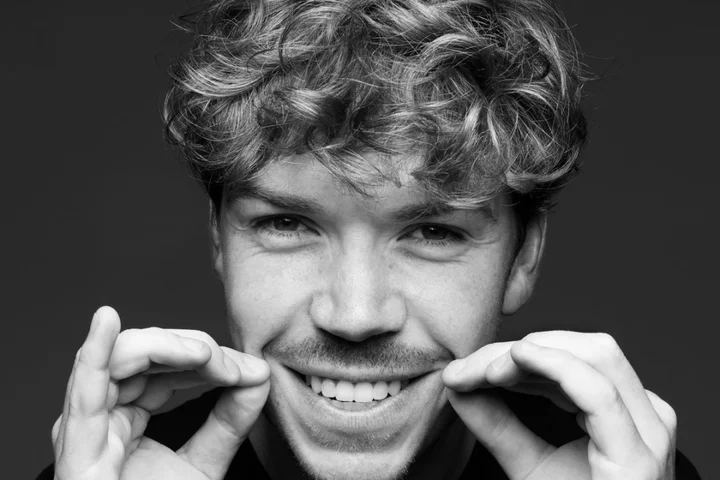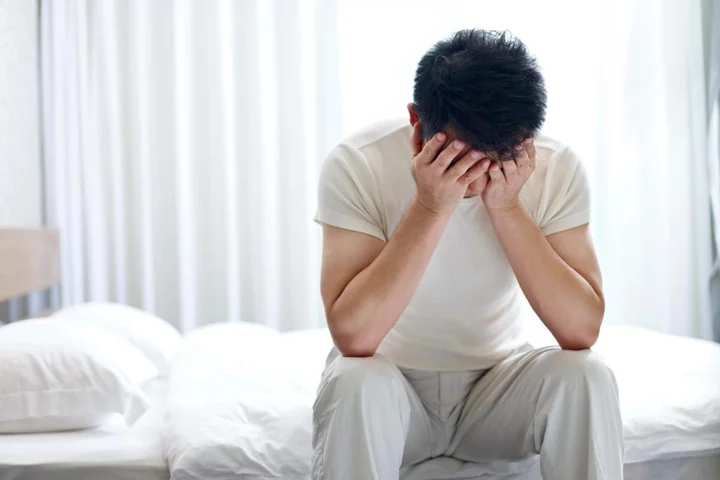
'We will never, ever get back together and replace Lemmy. That’s impossible...' Mikkey Dee says Motorhead will not reform
Heavy metal drummer Mikkey Dee says reforming Motorhead is “impossible” without late frontman Lemmy but he has vowed to play the band's songs live.
1970-01-01 08:00

Naomi Osaka opens up about fighting thoughts that she ‘won’t be a good mom’
Naomi Osaka has reflected on battling self-doubt and difficult thoughts as a new mother. The four-time Grand Slam tennis champion gave birth to her first child, a daughter named Shai, in July 2023. She shares Shai with her partner, rapper Cordae. On Sunday (22 October), Osaka shared some insights into her personal life with her fans to mark turning 26 earlier in the week. In an extended post on X, formerly Twitter, the Japanese athlete wrote about taking stock of her life so far, and wondering whether or not she’s taken the “correct path”. “I often try to retrace my steps to figure out how did I end up here,” she explained. “I know I say this often but I truly still feel like that kid playing on public courts in Queens, NY. “Randomly I wonder if I’m doing OK, is there a correct path to take in life or have I veered off onto the scenic route for a little bit? However, I’ve now come into the mindset that I can only keep moving forward and everything that will be, will be.” Osaka then shared her specific feelings of worry about her capabilities as a parent. “Something I had to conquer recently is fighting the thought that I won’t be a good mom,” she wrote. “So many doubts raced through my head I had to swat them away like mosquitoes. “Looking into Shai’s eyes and holding her I always think, ‘Wow this little person depends on me so much, I have to do better.’ It’s such a strange feeling watching your kid grow, you blink and they’re double the size in a few months. “Gratefulness reminds me to breathe and take in the little things (and the big ones).” Osaka ended her post by expressing her gratitude for having “another year” and for the people who support her. Osaka’s last competitive match was at the Toray Pan Pacific Open in September 2022, before she withdrew from the tournament due to abdominal pain. She announced her pregnancy in January 2023 shortly after stating that she wouldn’t be competing in the Australian Open later that month. Last month, Osaka spoke about her year away from playing tennis and mentioned how other female tennis stars’ longevity has influenced her desire to keep competing. “The whole process, it felt long and short at the same time,” she told the American sports news channel ESPN. “When I stepped away, it was Tokyo, that was the last tournament I played. I just remember watching the Australian Open and being very devastated, because I’ve never missed an Australian Open. “When I was watching Serena and Venus [Williams], I was thinking, ‘Ah, I probably no way will ever play at their age’, but sitting here, I’m like, ‘You know what? I might do that actually.’” Read More ‘Truly heartbroken’ Rebecca Adlington reveals late miscarriage Should we stop putting the clocks back? What the experts think ‘I lost over a stone on Ozempic, but now it’s run out what am I to do?’ ‘Truly heartbroken’ Rebecca Adlington reveals late miscarriage Should we stop putting the clocks back? What the experts think ‘I lost over a stone on Ozempic, but now it’s run out what am I to do?’
1970-01-01 08:00

Rebecca Adlington says she’s ‘truly heartbroken’ after late miscarriage
Rebecca Adlington has said she’s “truly heartbroken” as the British swimmer announced she had a miscarriage at 20 weeks pregnant. Adlington, 34, said she went for her 20-week scan earlier this week and was informed her baby had no heartbeat, adding she and husband Andy Parsons, 31, “will forever love and remember” their daughter. She wrote on Instagram: “I don’t really have the words right now but unfortunately we went for our 20-week scan this week and they discovered no heart beat [sic].” Adlington added that she gave birth to the baby – who the couple named Harper – on Friday (20 October) and “we held her, and had time with her”. The two-time Olympic gold medallist thanked the staff at the Wythenshaw hospital in Manchester for their “incredible” kindness and care, and Parsons for his “selfless support, love, and help”. “I don’t have the strength or words right now and don’t feel ready to share this news,” Adlington continued. “However, I can’t pretend to be okay or fake a smile. I can’t have people ask me how pregnancy is or when I am due as I still look pregnant. I don’t have the strength to tell this news individually.” The former I’m a Celebrity contestant announced she was pregnant on 1 October, sharing a photograph of her family taken at Disneyland Paris. Former track athletes Dame Jessica Ennis-Hill and Greg Rutherford, ex-hockey player Sam Quek, former swim champion Adam Peaty, and presenters Angellica Bell and Helen Skelton shared messages of support in the comments section of Adlington’s Instagram post. Ennis-Hill wrote: “Oh Becky I’m sending you and your family so much love. I’m so sorry xxxx.” Rutherford said: “Sending love to you. So sorry to read this Becky xx.” Quek also wrote: “Becky, I know no words will ease the pain… my entire heart is with you all.” Peaty’s message read: “I’m so sorry to hear this, my prayers are with you all” alongside a heart and praying hand emoji. Adlington previously revealed she had a miscarriage 12 weeks into her pregnancy last August, sharing the news on Instagram at the time. The mother-of-two wrote: “It’s such a devastating time but important in times like these we remember we aren’t alone and have so much support. “Long way to go but I’m in the right place,” she added. “Once I’m able to leave hospital I’m extremely grateful I get to go home and give my 2 little ones the best hugs!” Adlington, who has also appeared on Celebrity MasterChef, shares one son, Albie, two, with Parsons. She also has an eight-year-old daughter, Summer, from her first marriage to swimmer and personal trainer Harry Needs. You can contact the Miscarriage Association helpline on 01924 200799 or email the charity at info@miscarriageassociation.org.uk. The helpline is open from 9am to 4pm Monday to Friday. For more information, help and support regarding pregnancy loss, you can contact Tommy’s on 0800 0147 800. To contact Petals to enquire about the charity’s counselling services, you can call 0300 688 0068 or email counselling@petalscharity.org. Read More Should we stop putting the clocks back? What the experts think ‘I lost over a stone on Ozempic, but now it’s run out what am I to do?’ Consistent lack of sleep may increase risk of future depressive symptoms – study Should we stop putting the clocks back? What the experts think ‘I lost over a stone on Ozempic, but now it’s run out what am I to do?’ Consistent lack of sleep may increase risk of future depressive symptoms – study
1970-01-01 08:00

Man Utd vs Kobenhavn - Champions League: TV channel, team news, lineups & prediction
Preview of Manchester United's Champions League group-stage clash with Kobenhavn, including team news, how to watch on TV and live stream, predicted lineups and score prediction
1970-01-01 08:00

Man Utd predicted lineup vs Kobenhavn - Champions League
Manchester United's predicted starting XI for their Champions League meeting with Kobenhavn
1970-01-01 08:00

3 receivers available in trades, one maybe, and one who definitely isn't
As the NFL trade deadline approaches, the WR market is heating up. Here are three wideouts who are definitely available, one who might be, and one who is not.
1970-01-01 08:00

Rachel Campos-Duffy Appeared to Have Trouble Staying Awake on 'FOX & Friends Saturday'
VIDEO: Rachel Campos-Duffy couldn't keep her eyes open on FOX News.
1970-01-01 08:00

Sunak’s AI Guest List Risks Falling Short as Leaders Hold Back
Prime Minister Rishi Sunak was hoping his AI summit next month would bring heads of the most powerful
1970-01-01 08:00

3 teams that should call to save Alvin Kamara from New Orleans
With the New Orleans Saints' offense on the struggle bus, here are three NFL teams who should call about a potential Alvin Kamara trade.
1970-01-01 08:00

What does NLCS stand for?
The National League Championship Series (NLCS) is a crucial step to the coveted World Series. Learn about its history, structure, and the teams that have left their mark on it.
1970-01-01 08:00

Will Poulter says acting offered ‘escape’ from mental health issues
Will Poulter has suggested his acting career meant he didn’t address his mental health “as early as I might have”. The 30-year-old British star has been acting since he was a child, first appearing in the 2007 film Son Of Rambow. “I think for me, performance offered me something of an escape,” Poulter told the PA news agency. “For a while, maybe I wasn’t addressing some of my mental health issues as early as I might have, because I was losing myself in my work a little bit, and that’s probably quite relatable to a lot of people, whether they’re actors or not. “So it’s been a kind of blessing and a curse in that respect, if I’m being completely honest, but I’m obviously very, very grateful to have found something that ultimately I’m very passionate about and I love doing, so it nets out as being a positive and I’m grateful for it.” Poulter, who has been diagnosed with generalised anxiety disorder, depression and OCD, has teamed up with Movember for its 20th anniversary to raise funds and awareness of testicular cancer, prostate cancer, mental health and suicide prevention. He said his experiences with mental health have “textured my experience in a number of different ways”, and highlighted the importance of opening up. “I’ve found, certainly, that having the opportunity to talk in a kind of no-holds-barred fashion, and not to feel the kind of brunt of the stigma, has been really beneficial,” the Maze Runner star said. “I think, to a large extent, a problem shared is a problem halved… By talking to people more openly about the subject of mental health, you quickly come into contact with the idea that it’s often people that you wouldn’t necessarily assume are suffering from something. “Everyone has a mental health to consider, everyone’s dealing with something to some extent.” There's still quite an asphyxiating stigma around mental health Will Poulter He said he’s been “liberated to talk about my mental health relatively freely”, but accepted that isn’t necessarily the case for everyone. “Certainly on a societal level, there’s still quite an asphyxiating stigma around mental health. I think what Movember have long done is helped deconstruct that stigma and create a more hospitable environment for people to be able to talk about mental health.” He suggested that mental health is “especially stigmatised” in the male community. According to the Office for National Statistics (ONS), around three-quarters (74%) of the suicides registered in England and Wales in 2021 were men. It’s the leading cause of death in men aged 20-34. Movember also said it’s believed one in five (20%) of men in the UK aged between 16-29 experienced moderate to severe depressive symptoms in 2023. The charity took on mental health and suicide prevention as a cause area in 2006, focusing on prevention, early intervention and health promotion focusing around men. Poulter, who is teaming up with Movember for the second year in a row, said he’s “very fortunate to have a lot of people in my life, both men and women, who contribute to that conversation [around mental health] very openly”, but accepted there’s still a way to go. “It often requires a lot of courage on behalf of the person who’s dealing with a mental health issue to speak up. What I think we have to work towards is a destigmatised society, so it isn’t such a courageous thing to do.” He continued: “When you break it down, ultimately we’re talking about an organ, or talking about taking care of your body. When you think about it like that, to think there’s so much stigmatisation around talking about taking care of the most vital organ in your body, it seems kind of bizarre – but that is the situation we find ourselves in.” Poulter said he always tries to “think about it in those terms”, and talk about it like that with “people in my own household and those nearest and dearest to me”. He added: “It’s always fascinated me that physical health, largely speaking, doesn’t have the same stigma surrounding it. People talk about physical health more freely than they do mental health.” Movember is an annual event where people grow moustaches during the month of November to raise awareness of a variety of men’s issues, and 2023 marks 20 years since the charity was founded in a pub in Melbourne, Australia, by two friends. Portrait photographer Rankin has teamed up with Movember to photograph people including Poulter, ex-Arsenal footballer Jermaine Pennant, TV presenters Laura Whitmore and Iain Stirling, and members of boyband Busted. Poulter is an ambassador of Movember, united to take on mental health, suicide, prostate and testicular cancers. See Movember.com. For mental health support, contact the Samaritans on 116 123, email them at jo@samaritans.org, or visit samaritans.org to find your nearest branch. Read More 5 of the hottest new perfume launches for autumn/winter Consistent lack of sleep may increase risk of future depressive symptoms – study World Osteoporosis Day: The risk factors and early warning signs everyone needs to know about How to support a child with a stammer From colourful gowns to drones, these wedding trends are set take over 2024 Call The Midwife ‘should come with a health warning’
1970-01-01 08:00

Consistent lack of sleep may increase risk of future depressive symptoms – study
Consistently sleeping less than five hours a night could increase the risk of depression, research suggests. Poor sleep has been considered a side-effect of mental ill health in the past, but the new study found that the link between sleep and mental illness is more complex. People with a stronger genetic predisposition to short sleep – less than five hours in a given night – were more likely to develop depressive symptoms over four to 12 years, the study led by UCL researchers found. But those with a greater genetic predisposition to depression were not more likely to have short sleep. Using genetic susceptibility to disease, we determined that sleep likely precedes depressive symptoms, rather than the inverse Lead author Odessa Hamilton The experts also found that the link was not exclusive to those who were genetically inclined towards sleeping for shorter periods, and people who regularly dozed for five hours or less – without the genetic association – were also more likely to have depression. Lead author Odessa Hamilton, UCL Institute of Epidemiology and Health Care, said: “We have this chicken or egg scenario between suboptimal sleep duration and depression, they frequently co-occur, but which comes first is largely unresolved. “Using genetic susceptibility to disease, we determined that sleep likely precedes depressive symptoms, rather than the inverse.” Researchers used genetic and health data from 7,146 people recruited by the English Longitudinal Study of Ageing (ELSA), with an average age of 65. Short and long sleep durations, along with depression, are major contributors to (the) public health burden that are highly heritable Senior author Dr Olesya Ajnakina Analysis of genetic and health data suggested that short sleep was associated with the start of depressive symptoms, like feeling sad or lonely. Senior author Dr Olesya Ajnakina, UCL Institute of Epidemiology and Health Care and the Institute of Psychiatry, Psychology and Neuroscience at King’s College London, said: “Short and long sleep durations, along with depression, are major contributors to (the) public health burden that are highly heritable. “Polygenic scores, indices of an individual’s genetic propensity for a trait, are thought to be key in beginning to understand the nature of sleep duration and depressive symptoms.” When looking at non-genetic associations between depressive symptoms and sleep duration, the researchers also found that people sleeping five hours or less were 2.5 times more likely to develop depressive symptoms. And people with signs of depression were a third more likely to suffer from short sleep. Suboptimal sleep and depression increase with age, and with the worldwide phenomenon of population ageing there is a growing need to better understand the mechanism connecting depression and a lack of sleep Professor Andrew Steptoe The study, published in Nature, Translational Psychiatry, also revealed a link between sleeping long and developing depressive symptoms. According to the findings, people who slept for more than nine hours were 1.5 times more likely to develop depressive symptoms than those who sleep an average of seven hours. However, depressive symptoms were not associated with sleeping longer four to 12 years later, which corresponded to the genetic findings. Professor Andrew Steptoe, head of Behavioural Science and Health, UCL Institute of Epidemiology and Health Care, said: “Suboptimal sleep and depression increase with age, and with the worldwide phenomenon of population ageing there is a growing need to better understand the mechanism connecting depression and a lack of sleep. “This study lays important groundwork for future investigations on the intersection of genetics, sleep, and depressive symptoms.” People enrolled in the study had an average of seven hours’ sleep a night. More than 10% slept for less than five hours a night at the start of the study period, rising to more than 15% at the end of the study. The proportion of people classed as having depressive symptoms increased by about three percentage points, from 8.75% to 11.47%. In the study, data on sleep and depressive symptoms were combined from two Elsa surveys conducted two years apart, as sleep duration and depression are known to fluctuate over time. Sleep duration and depression are both partly inherited from one generation to the next. Earlier studies have suggested depression is about 35% heritable, and that genetic differences account for 40% of the variance in sleep duration. Read More World Osteoporosis Day: The risk factors and early warning signs everyone needs to know about How to support a child with a stammer From colourful gowns to drones, these wedding trends are set take over 2024 Call The Midwife ‘should come with a health warning’ Halloween: 10 wicked ways to kit out your haunted house Black magic: Go back to black this season with the catwalk-inspired trend
1970-01-01 08:00
